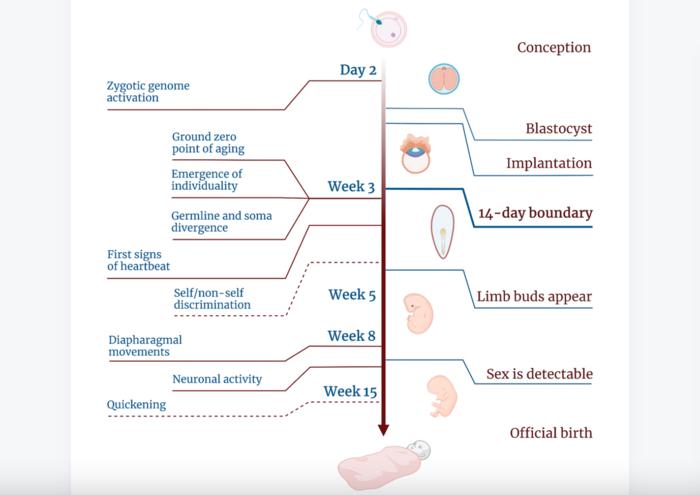“Debates on when human life begins are rooted deep in philosophical history. However, until recently they have been limited by the state of technology.”

Credit: 2024 Loseva and Gladyshev.
“Debates on when human life begins are rooted deep in philosophical history. However, until recently they have been limited by the state of technology.”
BUFFALO, NY- May 9, 2024 – A new review paper was published in advance by Aging (listed by MEDLINE/PubMed as “Aging (Albany NY)” and “Aging-US” by Web of Science), entitled, “The beginning of becoming a human.”
According to birth certificates, the life of a child begins once their body comes out of the mother’s womb. In this new review, researchers Polina A. Loseva and Vadim N. Gladyshev from Harvard Medical School pose the controversial question: when does their organismal life begin? Science holds a palette of answers—depending on how one defines a human life.
In 1984, a commission on the regulatory framework for human embryo experimentation opted not to answer this question, instead setting a boundary, 14 days post-fertilization, beyond which any experiments were forbidden. Recently, as the reproductive technologies developed and the demand for experimentation grew stronger, this boundary may be set aside leaving the ultimate decision to local oversight committees.
While science has not come closer to setting a zero point for human life, there has been significant progress in our understanding of early mammalian embryogenesis. It has become clear that the 14-day stage does in fact possess features, which make it a foundational time point for a developing human. Importantly, this stage defines the separation of soma from the germline and marks the boundary between rejuvenation and aging.
“We explore how different levels of life organization emerge during human development and suggest a new meaning for the 14-day stage in organismal life that is grounded in recent mechanistic advances and insights from aging studies.”
Read the full paper: DOI: https://doi.org/10.18632/aging.205824
Corresponding Authors: Polina A. Loseva, Vadim N. Gladyshev
Corresponding Emails: [email protected], [email protected]
Keywords: human, aging, 14-day rule, life
Click here to sign up for free Altmetric alerts about this article.
About Aging:
Aging publishes research papers in all fields of aging research including but not limited, aging from yeast to mammals, cellular senescence, age-related diseases such as cancer and Alzheimer’s diseases and their prevention and treatment, anti-aging strategies and drug development and especially the role of signal transduction pathways such as mTOR in aging and potential approaches to modulate these signaling pathways to extend lifespan. The journal aims to promote treatment of age-related diseases by slowing down aging, validation of anti-aging drugs by treating age-related diseases, prevention of cancer by inhibiting aging. Cancer and COVID-19 are age-related diseases.
Aging is indexed by PubMed/Medline (abbreviated as “Aging (Albany NY)”), PubMed Central, Web of Science: Science Citation Index Expanded (abbreviated as “Aging‐US” and listed in the Cell Biology and Geriatrics & Gerontology categories), Scopus (abbreviated as “Aging” and listed in the Cell Biology and Aging categories), Biological Abstracts, BIOSIS Previews, EMBASE, META (Chan Zuckerberg Initiative) (2018-2022), and Dimensions (Digital Science).
Please visit our website at www.Aging-US.com and connect with us:
- X, formerly Twitter
- YouTube
- Spotify, and available wherever you listen to podcasts
Click here to subscribe to Aging publication updates.
For media inquiries, please contact [email protected].
Aging (Aging-US) Journal Office
6666 E. Quaker Str., Suite 1B
Orchard Park, NY 14127
Phone: 1-800-922-0957, option 1
###
Journal
Aging-US
DOI
10.18632/aging.205824
Method of Research
Literature review
Subject of Research
People
Article Title
The beginning of becoming a human
Article Publication Date
6-May-2024




